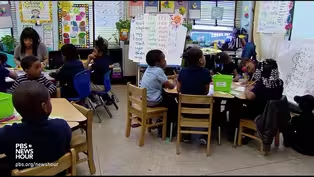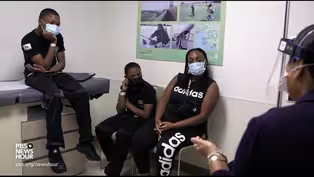
Invisible Scars | Part 2
Special | 10m 1sVideo has Closed Captions
Breaking the cycle of childhood trauma in rural Montana
PBS NewsHour explores America's childhood trauma crisis
Problems playing video? | Closed Captioning Feedback
Problems playing video? | Closed Captioning Feedback
Major corporate funding for the PBS News Hour is provided by BDO, BNSF, Consumer Cellular, American Cruise Lines, and Raymond James. Funding for the PBS NewsHour Weekend is provided by...

Invisible Scars | Part 2
Special | 10m 1sVideo has Closed Captions
PBS NewsHour explores America's childhood trauma crisis
Problems playing video? | Closed Captioning Feedback
How to Watch PBS News Hour
PBS News Hour is available to stream on pbs.org and the free PBS App, available on iPhone, Apple TV, Android TV, Android smartphones, Amazon Fire TV, Amazon Fire Tablet, Roku, Samsung Smart TV, and Vizio.
Providing Support for PBS.org
Learn Moreabout PBS online sponsorshipMore from This Collection
Invisible Scars: America’s Childhood Trauma Crisis
Video has Closed Captions
The overwhelming impact of childhood trauma on Chicago's West Side (10m 21s)
Video has Closed Captions
Childhood trauma impacts millions of Americans, and it’s having devastating consequences (10m 11s)
Providing Support for PBS.org
Learn Moreabout PBS online sponsorshipJUDY WOODRUFF: And now we continue our weeklong look at childhood trauma.
Tonight, we explore how trauma is passed down from generation to generation in rural Montana, where mental health resources are scarce and a stigma surrounds seeking treatment.
Special correspondent Cat Wise and producer Leah Nagy look at what is being done to break that cycle.
And a warning: This piece includes references to suicide and sexual abuse that may be disturbing to some viewers.
It's part of our series Invisible Scars: America's Childhood Trauma Crisis.
CAT WISE: At the end of a winding dirt road in Montana's Boulder Valley lies the three-room log cabin where Grace Foulk's story begins.
GRACE FOULK, Montana: What I remember most was being really little, and my dad would have these little campfires.
And we'd all sit in lawn chairs, and he'd just bring his guitar out and he'd play.
CAT WISE: It's an idyllic setting.
GRACE FOULK: We'd play in the creek.
There used to be a rope swing down here.
CAT WISE: But the rugged individualism that often still defines life in rural Montana can mask deep suffering, and darker moments from Grace's childhood cast a shadow on her happy memories.
GRACE FOULK: My dad, working at the mine, would leave for long periods at a time.
And suffering from bipolar, he would hit the lows and the depressions and he couldn't get out of bed.
He began drinking pretty heavily as well, like his father before him, I guess.
CAT WISE: A cycle of untreated trauma passed down from one generation to the next.
GRACE FOULK: His dad was an abusive alcoholic.
His grandpa was schizophrenic.
He never treated that wound properly.
He would just kind of self-medicate.
He had to pull up his bootstraps and be a man.
CAT WISE: When she was a freshman in high school, Grace's worst fear came true.
Her father took his life.
GRACE FOULK: I just fell into the deepest, darkest place that I have ever been in my entire life.
I was writing notes to loved ones, because I didn't want to be on this planet anymore.
Like, I thought about taking my own life.
CAT WISE: Grace's story is all too common in this state.
Montana has one of the highest rates of suicide in the country, including for adolescents.
Experts here say many children are growing up in homes plagued by domestic abuse, drug and alcohol addiction, and depression.
University of Montana Professor Ryan Tolleson Knee says a lack of resources, combined with a deeply ingrained stigma against even acknowledging mental health issues, has led to a crisis of untreated trauma in his state.
RYAN TOLLESON KNEE, University of Montana: There's a certain amount of stigma around seeking help or getting help from others or not solving problems on your own.
We also see it with respect to being able to access services in remote areas.
The rural areas are having a much harder time, hospitals that don't have the ability to stay alive in rural communities.
CAT WISE: Those were among the issues that contributed to a nightmare scenario in Grace's town of Big Timber several years ago.
AMBER MARTINSEN BLAKE, Community Mental Health Coordinator: Thirty percent of high school students had seriously thought about suicide.
Nineteen percent had actually attempted at least one or more times.
CAT WISE: Across rural Montana, school counselors are often the only resource for students struggling with mental health issues.
But Grace was lucky.
Her guidance counselor was able to connect her to a new program that Grace says saved her life.
In January 2019, Amber Martinsen-Blake became Montana's first community health worker specializing in mental health in rural areas.
She's now a trusted, discreet, local guide to mental health resources available in Big Timber and across the state via telehealth.
AMBER MARTINSEN-BLAKE: The fact that I'm from this community, I think, has played a huge role in our success with this program.
People know my face, they know my name.
And that's really your boots on the ground.
That's your trusted individual in the community who has a unique understanding of that culture and knows how to kind of work with that population.
CAT WISE: She connected Grace to one of the county's few therapists, Amber Overstreet.
AMBER OVERSTREET, Therapist: First, it's developing a relationship, so that therapy becomes a safe place, and then normalizing, there's a reason why we're here.
And then we kind of start to dig in to the memories themselves.
GRACE FOULK: So, I start seeing her.
And from the very first session, I'm opening up about things and learning things about myself that I didn't even realize about myself.
I just had so many blocks of shame and trauma.
CAT WISE: While attitudes and resources are starting to change in some parts of the state, other areas are still struggling, like Montana's reservations, where Native youth suicide deaths occur at five times the rate of the rest of the state.
Nationwide, Native American children are two to three times more likely than non-Hispanic white children to have experienced multiple ACEs, or adverse childhood experiences.
Those are potentially traumatic events that occur in childhood.
SAVANNAH SINQUAH, Montana: I remember, when I first took the ACEs study, my score was six, and that was really surprising to me.
CAT WISE: Savannah Sinquah grew up on the Crow Reservation, some 40 miles outside of Billings.
She was raised mostly by her mother.
SAVANNAH SINQUAH: Not having both parents in the household really affected my self-esteem, my confidence level, some of the stuff I have seen, of course, like family members that were thrown in jail or prison, physical abuse.
I actually lost track of how many family members I have lost to wrecks or drinking or overdosing.
With adults not being around, there was just predators, like sexual predators.
And there's a lot of things that have happened to me.
I am a sexual abuse survivor, whereas, unfortunately, probably a lot of us are.
But that's not something that is really spoken about.
CAT WISE: Savannah says many of the hardships experienced by children on the reservation today are the result of trauma that goes back generations.
Vast stretches of Sinquah's ancestors' lands were taken away by the U.S. government.
That displacement and many other injustices, she says, are at the root of so many problems Native people face around the country.
When Savannah learned about adverse childhood experiences for the first time, it was a wakeup call.
SAVANNAH SINQUAH: I felt like somebody had turned the light on in a dark room.
A lot of the shame, the guilt, it wasn't all stuff that was happening because of choices I made.
I was born into this trauma, historical trauma, transgenerational trauma, and it actually did affect my life as an adult now.
CAT WISE: That knowledge helped Savannah process her childhood experiences.
She now works as a therapist, and she's educating her community about trauma.
SAVANNAH SINQUAH: Now my generation, like, this is a new thing, but I am one of the first to learn about trauma and then come out and teach my people.
But there's still not a lot of knowledge.
CAT WISE: At a recent family dinner, Savannah's aunt and mother shared how she helped them see their own history through a new lens.
WOMAN: I never thought of myself as traumatized.
The kind of traumas I think of are were like what she had to go through.
Couldn't talk Crow in school.
Could only talk English, so that they had to use sign language.
I think about that.
And, in my head, that's real trauma.
CAT WISE: Savannah says she hopes that recognizing trauma will be the first step in a long journey of healing for her community.
SAVANNAH SINQUAH: Kids are so resilient.
They will love people that have -- sorry.
They will love people that have put them through so much.
But they're showing up every day.
And that's just so, so powerful.
And children,, give me hope that, one day, things will be better.
CAT WISE: Grace Foulk shares that hope.
Now, when she returns to the land where she grew up, she can feel how far she's come.
GRACE FOULK: This is where my father, he took his life.
I think it was about two years before I came back down here.
It doesn't give me a negative feeling to be down here.
We have really worked hard to make peace with things.
CAT WISE: Grace is working for the community health program that set her on a new course in life.
GRACE FOULK: My dad always used to talk about breaking the chain.
It was something that he really wanted to do.
I feel like I have this opportunity to look at other people in the eyes who've gone through a similar experience as me and to tell them, you're going to be OK.
I'm kind of hell-bent on being the chain-breaker, because it's what my dad would have wanted.
CAT WISE: And she's now a musician, like her dad.
(SINGING) CAT WISE: She will carry on his song, but she hopes her family's chain of trauma has been broken with her.
For the "PBS NewsHour," I'm Cat Wise in Montana.
JUDY WOODRUFF: Thank you, Cat.
And you can listen to more of Grace's song on Instagram.
You can find us at Instagram.com/NewsHour.

- News and Public Affairs

FRONTLINE is investigative journalism that questions, explains and changes our world.

- News and Public Affairs

Amanpour and Company features conversations with leaders and decision makers.












Support for PBS provided by:
Major corporate funding for the PBS News Hour is provided by BDO, BNSF, Consumer Cellular, American Cruise Lines, and Raymond James. Funding for the PBS NewsHour Weekend is provided by...

